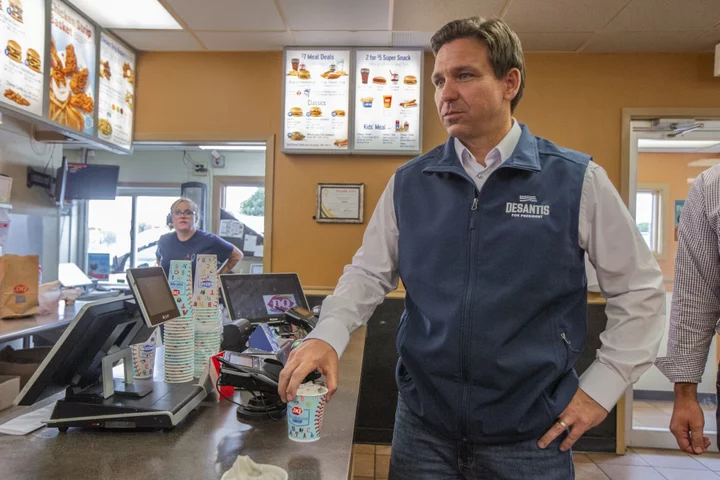Ron DeSantis’s team sought to reassure donors about the rocky start to his presidential campaign bid by summoning them to Tallahassee for a briefing with senior staff and holding a reception at the Florida governor’s mansion on Sunday afternoon.
Just seven weeks into DeSantis’s official launch for the White House, his campaign is already hitting the reset button. He recently fired a handful of staffers due to a cash crunch; pivoted on an insular media strategy to start doing national television interviews; and pared down the travel schedule to prioritize trips to must-win early voting states Iowa, South Carolina and New Hampshire.
This reset isn’t over yet, either.
No campaign staffer should assume their job is safe as the governor struggles to overcome former President Donald Trump’s wide polling lead and DeSantis tries to recover from several self-inflicted errors, according to people familiar with the matter.
His team plans a retreat this coming weekend for major donors in Park City, Utah, according to two people who were invited, where they will also discuss the state-of-play.
The campaign shakeup takes place with just six months until Iowa’s first-in-the-nation Republican caucus. DeSantis had long been viewed as the most viable challenger to Trump, branded as more cerebral with less baggage. But the excitement for his bid was also haunted by the specter of past popular GOP governors who fizzled early in their presidential bids, namely Florida Governor Jeb Bush and former Wisconsin Governor Scott Walker.
“It is smart to reset. I saw firsthand that Scott Walker had too many people during the same period,” said Dan Eberhart, chief executive officer of Canary Drilling Services, LLC, an energy company based in Colorado and a DeSantis supporter. “In Governor DeSantis’s case: Lean even more on the super-PAC.”
The DeSantis team has been starting to pivot for the past few weeks — unveiling policy proposals each month and putting Casey DeSantis, the governor’s wife, on the campaign trail for solo events earlier than it had planned to, according to sources briefed on the plans. The governor also started to take questions at events from voters recently after previously shunning that tradition in early visits to Iowa and New Hampshire.
The fired staffers primarily came from the campaign’s political events, media and marketing teams. Many of them aim to find jobs with the super-PAC, called “Never Back Down” or aligned DeSantis groups, but there aren’t guarantees. They boxed up their belongings on Friday in what was described as a depressing day in the campaign office.
The campaign had more than 90 people on payroll and wasn’t raising money as fast as anticipated to support such a large team, said one source familiar with the operation.
His team also spent the weekend reaching out to donors, who couldn’t make the Tallahassee meeting. One said they kept emphasizing presidential campaigns go through growing pains.
“You are building a campaign business from scratch. It is a start up business. You think you know the people you need and how many you need, but then you figure out after a quarter who is capable, who is in it for the long run, who are your stars and then you right-size it,” said Roy Bailey, a Dallas-based businessman and key fund raiser for DeSantis. “You want to make sure you are being as efficient as possible. To me, it makes total business sense.”
DeSantis always faced a challenge in taking on Trump, who holds an ironclad grip on roughly 30% of Republican primary voters. But they drew confidence from the governor’s landslide November reelection, billing Florida’s metamorphosis from a swing state to a Republican bastion as a blueprint.
What his campaign didn’t anticipate, however, was the way Trump’s two indictments mobilized and energized the Republican base to rally around the former president.
A DeSantis spokesman said voters were rallying behind the governor. “His momentum will only continue as voters see more of him in person, especially in Iowa,” said spokesman Andrew Romeo. “Defeating Joe Biden and the $72 million behind him will require a nimble and candidate-driven campaign, and we are building a movement to go the distance.”
Apart from the question of likability, the DeSantis team made several unforced errors.
Recently, some donors recoiled from a video the DeSantis rapid response team shared online that compared the governor’s record on LGBQT issues to Trump’s. The video’s odd splicing of music, visuals and clips from movies like “American Psycho” made some donors think his campaign was unprofessional and homophobic. One donor said he would like to see changes to the rapid response and communications teams as a result.
Other donors didn’t like the six-week abortion ban DeSantis signed in the spring, or his waffling stance on Russia’s invasion on Ukraine.
He’s also failed to put to rest questions about his comfort in interacting with voters in small one-on-one settings, while Trump, previously known to loathe those interactions, ramps up visits to pizza parlors and ice cream shops on the trail.
DeSantis allies have been calling national reporters to try and influence the tone of his coverage. On Tuesday, he will sit for his first major TV interview with a non-conservative outlet, appearing on CNN with Jake Tapper.
The super-PAC’s staffers are also working hard to turn out the vote in Iowa, in particular, with the idea that even if DeSantis does not poll as well as Trump, they can beat him with a superior ground game.
--With assistance from Mario Parker.

